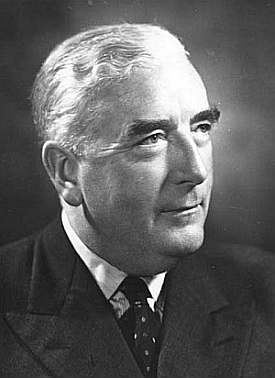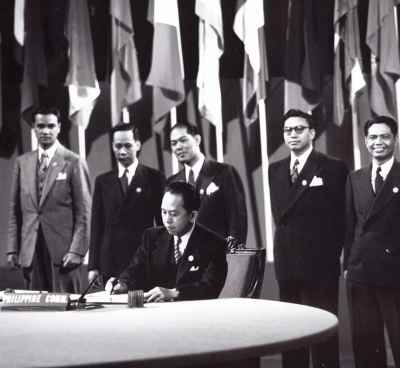Carlos P. Romulo: I am a Filipino – inheritor of a glorious past, hostage to the uncertain future. As such I must prove equal to a two-fold task- the task of meeting my responsibility to the past, and the task of performing my obligation to the future. I sprung from a hardy race – child of many generations removed of ancient Malayan pioneers. Across the centuries, the memory comes rushing back to me: of brown-skinned men putting out to sea in ships that were as frail as their hearts were stout. Over the sea I see them come, borne upon the billowing wave and the whistling wind, carried upon the mighty swell of hope- hope in the free abundance of new land that was to be their home and their children’s forever.
This is the land they sought and found. Every inch of shore that their eyes first set upon, every hill and mountain that beckoned to them with a green and purple invitation, every mile of rolling plain that their view encompassed, every river and lake that promise a plentiful living and the fruitfulness of commerce, is a hollowed spot to me.
By the strength of their hearts and hands, by every right of law, human and divine, this land and all the appurtenances thereof – the black and fertile soil, the seas and lakes and rivers teeming with fish, the forests with their inexhaustible wealth in wild life and timber, the mountains with their bowels swollen with minerals – the whole of this rich and happy land has been, for centuries without number, the land of my fathers. This land I received in trust from them and in trust will pass it to my children, and so on until the world no more.
I am a Filipino. In my blood runs the immortal seed of heroes – seed that flowered down the centuries in deeds of courage and defiance. In my veins yet pulses the same hot blood that sent Lapulapu to battle against the alien foe that drove Diego Silang and Dagohoy into rebellion against the foreign oppressor.
That seed is immortal. It is the self-same seed that flowered in the heart of Jose Rizal that morning in Bagumbayan when a volley of shots put an end to all that was mortal of him and made his spirit deathless forever; the same that flowered in the hearts of Bonifacio in Balintawak, of Gergorio del Pilar at Tirad Pass, of Antonio Luna at Calumpit; that bloomed in flowers of frustration in the sad heart of Emilio Aguinaldo at Palanan, and yet burst fourth royally again in the proud heart of Manuel L. Quezon when he stood at last on the threshold of ancient Malacañang Palace, in the symbolic act of possession and racial vindication.
The seed I bear within me is an immortal seed. It is the mark of my manhood, the symbol of dignity as a human being. Like the seeds that were once buried in the tomb of Tutankhamen many thousand years ago, it shall grow and flower and bear fruit again. It is the insigne of my race, and my generation is but a stage in the unending search of my people for freedom and happiness.
I am a Filipino, child of the marriage of the East and the West. The East, with its languor and mysticism, its passivity and endurance, was my mother, and my sire was the West that came thundering across the seas with the Cross and Sword and the Machine. I am of the East, an eager participant in its struggles for liberation from the imperialist yoke. But I also know that the East must awake from its centuried sleep, shape of the lethargy that has bound his limbs, and start moving where destiny awaits.
For, I, too, am of the West, and the vigorous peoples of the West have destroyed forever the peace and quiet that once were ours. I can no longer live, being apart from those world now trembles to the roar of bomb and cannon shot. For no man and no nation is an island, but a part of the main, there is no longer any East and West – only individuals and nations making those momentous choices that are hinges upon which history resolves.
At the vanguard of progress in this part of the world I stand – a forlorn figure in the eyes of some, but not one defeated and lost. For through the thick, interlacing branches of habit and custom above me I have seen the light of the sun, and I know that it is good. I have seen the light of justice and equality and freedom and my heart has been lifted by the vision of democracy, and I shall not rest until my land and my people shall have been blessed by these, beyond the power of any man or nation to subvert or destroy.
I am a Filipino, and this is my inheritance. What pledge shall I give that I may prove worthy of my inheritance? I shall give the pledge that has come ringing down the corridors of the centuries, and it shall be compounded of the joyous cries of my Malayan forebears when they first saw the contours of this land loom before their eyes, of the battle cries that have resounded in every field of combat from Mactan to Tirad pass, of the voices of my people when they sing:
Land of the Morning,Child of the sun returning…Ne’er shall invadersTrample thy sacred shore.
Out of the lush green of these seven thousand isles, out of the heartstrings of sixteen million people all vibrating to one song, I shall weave the mighty fabric of my pledge. Out of the songs of the farmers at sunrise when they go to labor in the fields; out of the sweat of the hard-bitten pioneers in Mal-ig and Koronadal; out of the silent endurance of stevedores at the piers and the ominous grumbling of peasants Pampanga; out of the first cries of babies newly born and the lullabies that mothers sing; out of the crashing of gears and the whine of turbines in the factories; out of the crunch of ploughs upturning the earth; out of the limitless patience of teachers in the classrooms and doctors in the clinics; out of the tramp of soldiers marching, I shall make the pattern of my pledge:
“I am a Filipino born of freedom and I shall not rest until freedom shall have been added unto my inheritance – for myself and my children’s children – forever.


